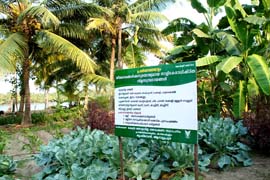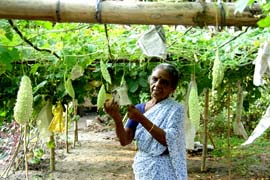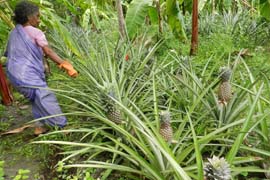 Under coastal weather conditions, the crop productivity remains low due to poor physico-chemical properties of soil. During Front Line Demonstrations by ICAR-Central Plantation Crops Research Institute, Kasaragod in farmers’ gardens in the southern coastal tracts of Kerala at Arattupuzha (Alappuzha district) and Alappad (Kollam District), poor fertility status of the soil, water logging due to precipitation variation and salt water inundation were observed as major impediment to successful cultivation of coconut . This peculiar situation in the tract made it difficult for the farmers to take up cultivation of many of the intercrops and adopt year-round cultivation.
Under coastal weather conditions, the crop productivity remains low due to poor physico-chemical properties of soil. During Front Line Demonstrations by ICAR-Central Plantation Crops Research Institute, Kasaragod in farmers’ gardens in the southern coastal tracts of Kerala at Arattupuzha (Alappuzha district) and Alappad (Kollam District), poor fertility status of the soil, water logging due to precipitation variation and salt water inundation were observed as major impediment to successful cultivation of coconut . This peculiar situation in the tract made it difficult for the farmers to take up cultivation of many of the intercrops and adopt year-round cultivation.
 The rich experience of a farmer couple, 90 years old Shri Devadas, a Homeo Doctor and Smt.Sathyavathi, retired Headmistress from Alappad Panchayat of Kollam District and another farmer Shri Babu Muthiraparambil, from Arattupuzha Panchayat of Alappuzha District of Kerala paved a way in successfully refining the technologies to suit to the requirements of coastal farmers of South Kerala. The demonstrations were undertaken in an area of 0.6 ha each in both the places during 2012 - 2015.
The rich experience of a farmer couple, 90 years old Shri Devadas, a Homeo Doctor and Smt.Sathyavathi, retired Headmistress from Alappad Panchayat of Kollam District and another farmer Shri Babu Muthiraparambil, from Arattupuzha Panchayat of Alappuzha District of Kerala paved a way in successfully refining the technologies to suit to the requirements of coastal farmers of South Kerala. The demonstrations were undertaken in an area of 0.6 ha each in both the places during 2012 - 2015.
The soils in both the locations were found to be non-saline, having pH ranging from 4.5 to 6.3 with low levels of organic carbon, K, Ca and Mg and higher levels of P, Mn, Fe and Zn. To overcome the problems of water logging and salt water inundation, different intercrops like banana (4 varieties), pine apple, vegetables including cool season vegetables, tuber crops, fodder grass, ginger and turmeric were tested for their adaptability. Various intercrops were planted with and without husk burial in the planting pits/ application of coir pith compost under coastal sandy conditions and their performance was evaluated. Pine apple was found to be the most ideal crop to withstand water logging, yielding fruits on an average 1.0-1.75 kg . Banana varieties also performed well and bunches weighed on an average of 7 kg for Nendran, 13.5 kg for Njalipoovan and 22.5 kg for Robusta. All the tuber crops (except colocasia) were found to be affected by water logging. Among the vegetables, amaranthus, bitter gourd, cow pea, tomato, cauliflower and cabbage performed well. Cauliflower weighing up to two kg and cabbage up to 2.50 kg could be harvested. The farmers could get single plant yield up to 18 kg from bitter gourd and four kg from cow pea.
 The yield of coconut also showed improvement up to 59% at Arattupuzha and 55% at Alappad. The net income from the coconut based cropping system varied depending on the intensity of intercrops cultivated. Shri Devadas and Smt. Sathyavathi realised a net income of Rs.1.35 lakh during 2013-14, while that earned by Shri Babu was Rs.1.89 lakh.
The yield of coconut also showed improvement up to 59% at Arattupuzha and 55% at Alappad. The net income from the coconut based cropping system varied depending on the intensity of intercrops cultivated. Shri Devadas and Smt. Sathyavathi realised a net income of Rs.1.35 lakh during 2013-14, while that earned by Shri Babu was Rs.1.89 lakh.
Several farm level climate smart practices were adopted by the farmers to increase productivity and build resilience in the coastal tracts with climatic vagaries. A modified method of sideways placement of husk around the plant for pine apple showed better performance when compared to normal recommendation under water logged conditions. This has resulted in better growth, early bearing and higher fruit weight for pine apple (average 1.75 kg)compared to normal planted ones (average 1.00 kg).
Other climate resilient measures adopted by farmers including advancement of planting time of tuber crops and banana and standardizing the age of banana suckers for planting were proved to be successful. Planting 4-5 months old suckers of Njalipoovan variety of banana during November-December was found to help tide over the water logging experienced during the early stages of bunch development. Earthing up with silt (150 kg/plant) along with application of 100g of Muriate of Potash/plant at the time of bunch emergence improved growth of plants. By this refinement, the farmers could save 100% of the plants from lodging and poor finger formation due to water logging.
Because of the coincidence of rainy season with growth period of most of the tuber crops, it was difficult for the farmers to raise them under normal planting time. By planting short duration varieties of tapioca like Vellayani Hraswa (5-6 months), Sree Jaya (7 months),and Sree Vijaya (6-7 months) and through advancement of planting time to October-November, the farmers could get a reasonable yield (average 3.2 kg/plant). In case of elephant foot yam and dioscorea, the farmers retained the previous year’s crop in the field and obtained average yields of 6.3 kg from Dioscorea, 5.2 kg from Gajendra variety and 13.5 kg from Peerumedu Local variety of elephant foot yam.
(Source: ICAR-CPCRI)







फेसबुक पर लाइक करें
यूट्यूब पर सदस्यता लें
X पर फॉलो करना X
इंस्टाग्राम पर लाइक करें